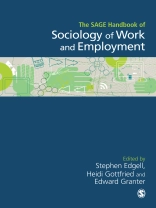The SAGE Handbook of the Sociology of Work and Employment is a landmark collection of original contributions by leading specialists from around the world.
The coverage is both comprehensive and comparative (in terms of time and space) and each ‘state of the art’ chapter provides a critical review of the literature combined with some thoughts on the direction of research. This authoritative text is structured around six core themes:
- Historical Context and Social Divisions
- The Experience of Work
- The Organization of Work
- Nonstandard Work and Employment
- Work and Life beyond Employment
- Globalization and the Future of Work.
Globally, the contours of work and employment are changing dramatically. This handbook helps academics and practitioners make sense of the impact of these changes on individuals, groups, organizations and societies.
Written in an accessible style with a helpful introduction, the retrospective and prospective nature of this volume will be an essential resource for students, teachers and policy-makers across a range of fields, from business and management, to sociology and organization studies.
Table des matières
1. Introduction: Studies of Work and Employment at the Global Frontier – Stephen Edgell, Edward Granter and Heidi Gottfried
PART 1 HISTORICAL CONTEXT AND SOCIAL DIVISIONS
2. The Disciplinary Career of the Sociology of Work – Tim Strangleman
3. Work and Social Theory – Tracey Warren
4. Class and Work – Barry Eidlin
5. Gender and Work – Harriet Bradley
6. Race, Racialization and Work – Evelyn Nakano Glenn
PART 2 THE EXPERIENCE OF WORK
7. Good Jobs, Bad Jobs – Arne Kalleberg
8. The Origins and the Ideal of Dignity in the Sociology of Work and Employment – Philip Hodgkiss
9. Capital and Labour: The shifting terrains of struggle and accommodation in labour and employment relations – Miguel Martinez- Lucio
10. From Management to Leadership – Leo Mc Cann
11. Unruly Subjects: Misbehaviour in the Workplace – Stephen Ackroyd and Paul Thompson
12. Rediscovery of the Labour Process – Chris Smith
13. The Skill Debate: Concepts, Measures and Evidence – Alan Felstead
PART 3 WORK AND ORGANIZATION
14. From Bureaucracy to Networks – Charles Heckscher
15. Organizational Culture – Mats Alvesson
16. Industrialization, Fordism and the Golden Age of Atlantic Capitalism: – Matt Vidal
17. Beyond Fordism – Huw Beynon
18. Interactive Service Work – Amy Wharton
19. The Organization of Service Work – Kiran Mirchandani
Part 4 NON-STANDARD FORMS OF WORK AND EMPLOYMENT
20. Employment Uncertainty and Risk – Vicki Smith
21. Destandardization: Qualitative and Quantitative – Francoise Carre
22. Informal Employment: Theory & Reality – Martha Chen
23. Precarious Work – Kevin Hewison
24. Unpaid Domestic Labor – Janeen Baxter and Tsui-O Tai
PART 5 WORK AND LIFE OUTSIDE EMPLOYMENT
25. Unemployment – Ken Roberts
26. Volunteering and Unpaid Work – Rebecca Taylor
27. Work-Life Balance – Abigail Gregory
28. Working Time – Michael Bittman
29. Work and Social Policy – Karin Gottschall and Irene Dingeldey
PART 6 GLOBALIZATION AND THE FUTURE OF WORK
30. Global Value Chains, Organisations and Industrial Work – Paul Stewart and Brian Garvey
31. Globalization and Outsourcing – Winnie Poster and Nima Yolmo
32. Globalization and Labour Migrations – Eleonore Kofman
33. Critiques of Work – David Frayne
34. Global Labour Politics in the 21st Century: Organizing in Informal and Precarious Jobs – Jennifer Jihye Chun and Rina Agarwala
35. The Future of Work: Escaping the Current Dystopian Trajectory and Building Better Alternatives – Peter Evans and Chris Tilly
A propos de l’auteur
Edward Granter is a Senior Lecturer in Organizational Behaviour in the Department of Management at the University of Birmingham Business School.












